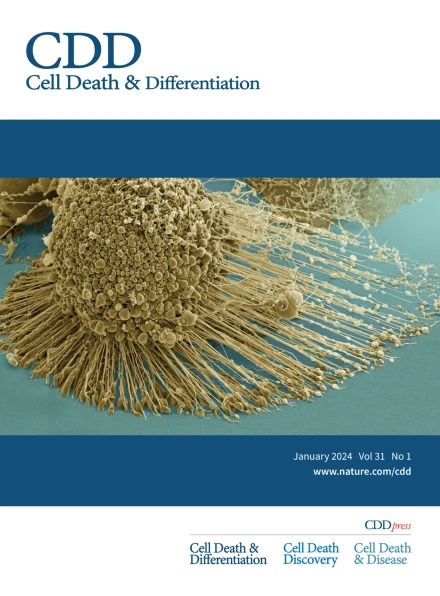由 circSpdyA 编码的 127aa 可促进乳腺癌中的 FA 合成和 NK 细胞抑制作用
IF 13.7
1区 生物学
Q1 BIOCHEMISTRY & MOLECULAR BIOLOGY
引用次数: 0
摘要
脂质代谢重编程在乳腺癌肿瘤发生和免疫逃逸中起着关键作用。但对其潜在机制和调控因子的研究却很少。因此,我们建立了一个体内肿瘤发生模型,用普通饮食和高脂饮食处理小鼠乳腺癌细胞,收集样本并进行circRNA序列分析,以扫描调控脂质代谢的潜在circRNA。CircSpdyA是上调最多的circRNA之一,有可能编码127 aa的微肽(简称127aa)。127 aa 通过直接与 FASN 结合促进脂肪酸从头合成,从而促进肿瘤发生。单细胞序列表明,127aa 能抑制 NK 细胞的浸润和功能。这是通过表观遗传抑制 NK 细胞激活剂的转录实现的。此外,127aa 阳性癌细胞中的脂质负载转移到 NK 细胞中也抑制了细胞毒性。综上所述,circSpdyA编码的127aa通过直接与FASN结合促进脂肪酸的从头合成,并通过抑制NK细胞激活因子的转录诱导NK细胞抑制。本文章由计算机程序翻译,如有差异,请以英文原文为准。


127aa encoded by circSpdyA promotes FA synthesis and NK cell repression in breast cancers
Lipid metabolism reprogram plays key roles in breast cancer tumorigenesis and immune escape. The underlying mechanism and potential regulator were barely investigated. We thus established an in vivo tumorigenesis model, mice-bearing breast cancer cells were treated with an ordinary diet and high-fat diet, species were collected and subjected to circRNA sequence to scan the potential circRNAs regulating the lipid metabolism. CircSpdyA was one of the most upregulated circRNAs and had the potential to encode a 127-aa micro peptide (referred to as 127aa). 127 aa promotes tumorigenesis through promoting the fatty acid de novo synthesis by directly binding to FASN. Single-cell sequence indicated 127aa inhibited NK cell infiltration and function. This was achieved by inhibiting the transcription of NK cell activators epigenetically. Moreover, lipid-laden from 127aa positive cancer cells transferred to NK cells inhibited the cytotoxicity. Taken together, circSpdyA encoded 127aa promotes fatty acid de novo synthesis through directly binding with FASN and induced NK cell repression by inhibiting the transcription of NK cell activators.
求助全文
通过发布文献求助,成功后即可免费获取论文全文。
去求助
来源期刊

Cell Death and Differentiation
生物-生化与分子生物学
CiteScore
24.70
自引率
1.60%
发文量
181
审稿时长
3 months
期刊介绍:
Mission, vision and values of Cell Death & Differentiation:
To devote itself to scientific excellence in the field of cell biology, molecular biology, and biochemistry of cell death and disease.
To provide a unified forum for scientists and clinical researchers
It is committed to the rapid publication of high quality original papers relating to these subjects, together with topical, usually solicited, reviews, meeting reports, editorial correspondence and occasional commentaries on controversial and scientifically informative issues.
 求助内容:
求助内容: 应助结果提醒方式:
应助结果提醒方式:


